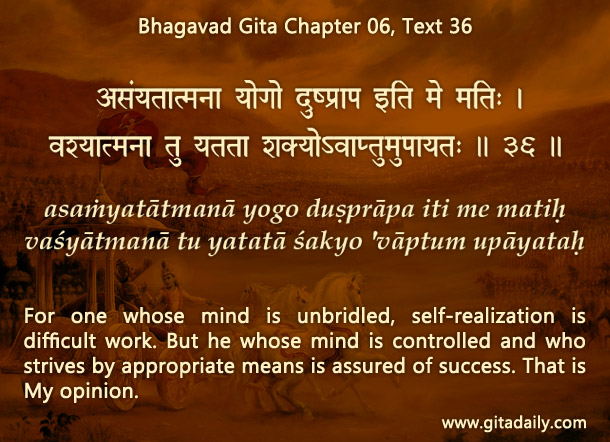In the Bhagavad Gita 6.56, Krishna states that the mind can be managed only by an appropriate process. This emphasis on an appropriate process indicates that we cannot simply use brute force in controlling the mind all the time. When the mind comes up with a deadly, destructive urge, such as wanting to viciously attack someone who has provoked us, we may need to be ruthlessly firm in pushing that urge and not letting ourselves turn into a violent, out-of-control maniac.
Simultaneously, however, it is important that we recognize that such an approach is only addressing the symptoms, not curing the underlying disease. If we get an urge to cough while hiding from rioters who are out to kill us, then we may forcefully suppress that cough. But we wouldn’t be instructed to do that under more normal circumstances. We would often go to a doctor to get the cough treated. Similarly, we need to get the proper treatment for healing the mind, not just rely on suppressing it.
Healing the mind centers on replacing unhealthy impressions within it with healthier impressions. While some unhealthy impressions may need to be specifically replaced by those that address a particular concern or need in a more harmonious and less disruptive way, we cannot spend our time trying to do psychoanalysis on a single impression within us. Instead, we should focus on connecting with the divine through immersion in devotional meditation centered on remembrance alone.
Such immersion creates potent, positive impressions that can override and overwrite unhealthy impressions. How much we open our mind and heart to receive the sacred sound of the holy name and the precious remembrance of the Lord during our time of exclusive meditation will determine how rapidly, strongly, and deeply the fresh impressions are formed within us. That’s why, rather than worrying about whether we will be able to manage our mind in the future when we face provocation, we can focus on managing our mind in the present. This will allow us to cultivate devotion and minimize distraction.
Such devotional absorption will be the cure for our afflicted mind, and that cure will automatically address the symptoms of the mind’s destructive impulses in the future. Those impulses will naturally decline and disappear as healthier impressions are formed.
Summary:
- Using brute force to crush the mind’s urges may be occasionally necessary, but it only addresses the symptom without curing the underlying issue.
- To heal our diseased mind, we need to replace unhealthy impressions with healthier ones.
- The best way to form healthier impressions is through devotional meditation, which allows the divine presence to overwrite unhealthy emotions and influences.
Think it over:
- When can a brute force approach be used for dealing with the mind’s impulses?
- What is a sustainable and transformative approach to healing the mind?
- What is the best way to prepare for future provocations?
06.36 For one whose mind is unbridled, self-realization is difficult work. But he whose mind is controlled and who strives by appropriate means is assured of success. That is My opinion.


Leave A Comment